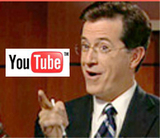The screen above shows a rant by CBS host Craig Ferguson on the subject of his own alcoholism. It’s a good monologue.
That’s not why it is here. Note that when you link to it you will find it comes directly from CBS. It is of high quality. You can see exactly how many times it has been viewed — about 320,000 by last count — and what people think of it.
This is invaluable data. There’s also space for an ad on the top and an adblock in the corner that could, in the future, contain another ad. A short ad could also be embedded into the stream, by CBS. There’s already a few seconds advertising the show at the end.
There are many ways in which CBS (and YouTube) can monetize this, and the cost to CBS is zero. Nada. Zilch. Nothing. Bupkis. The null set.
Now contrast this with what Viacom has done, pulling its videos from YouTube. First let’s look at the initial costs of pulling its content:
- Lots of angry Internet users.
- Negative publicity.
- Lower audiences.
- Costs for hosting the content itself.
The company has tried to recover by striking a deal with a start-up competitor, and claims it benefits because it can get "premium CPMs."
Viacom also claims that it’s avoiding "piracy." Which means what exactly? It seems to mean that they’re not going to have their video content hosted on Web sites like this, with context provided by people like me.
Where is the financial gain in that?

The gentleman to the left is Stephen Colbert. Before this broke out, he was gaining enormous traction through the Internet. Have you noticed that has stopped? The buzz is falling, and in time that means Colbert’s show falls, too. That’s a real cost.
So far, of course, Viacom is pulling out all the PR stops. It’s leaking the idea that Google’s CBS deal is falling apart. It’s claiming big traffic and monetary gains. It’s claiming the whole industry is behind it. By comparing last quarter 2006 financial numbers and late February site traffic numbers, it can claim it’s winning. This is noise. It’s bullshit.
Google, meanwhile, reports higher traffic at YouTube, 1,000 official agreements to host copyrighted content, and add the BBC to that list. One stupid thing being done in many of these agreements is to claim this content is being placed into specific "channels." What is a channel in the context of the Internet? Either you can reach it via a search engine or you can’t. Either you can host a version of it elsewhere or you can’t. And is Viacom now going to sue Google so that its clips can’t be linked-to, even at Joost?
The fact is we now have everything we need to come to an agreement. We have data, not just traffic data but cost data. We have potential revenue data as well, thanks to Viacom’s own sales efforts. And once you know that, you can apportion the revenue.
Viacom’s move, in fact, was the beginning of a negotiation. This is a point no one in the media has made until now. Cut through the rhetoric and the fact is that having someone else host something which makes you money costs less than hosting it yourself. Having a lot of people host something that makes you money brings you the most money, so long as you can follow the money. This is the heart of the broadcast business model.
Thus the copyright war should end this year. Because once you have a settlement in video, which is the highest-cost content to produce, you have something you can take to every other type of file, so that it can be freely shared on the Internet and people who produce it, as well as host it, can get paid.
Which in the end is all anyone cares about.










